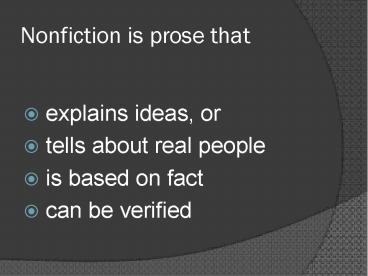Nonfiction is prose that - PowerPoint PPT Presentation
Title: Nonfiction is prose that
1
Nonfiction is prose that
- explains ideas, or
- tells about real people
- is based on fact
- can be verified
2
Fact vs. Truth
- Although nonfiction is based on fact, it is false
to assume that fact and truth are the same
thing.
3
The Truth
- It is impossible to tell the whole truth
about any experience. - Do you swear to tell the truth, the whole
truth, and nothing but the truth?
4
Nonfiction
- The very act of putting something into words
changes it.
5
Diction authors choice of words
- The particular words we choose tell something
about - our actual experience
- our personality
- our personal beliefs or prejudices
- our background
- our purpose as the writer ()
6
Purpose authors intention or reason
- Every good writer of nonfiction has a purpose
when he or she writes.
7
Purpose
- The purpose may be
- to explain or inform
- to create a mood or emotion
- to tell about a series of events
- to persuade the reader to believe something or to
do something.
8
Forms of Nonfiction
- Reports
- Factual accounts of places or events
9
Forms of Nonfiction
- Essay
- - Short work about particular subject
- - Reveals much about the writer
- - Tone conversational, sometimes humorous
- - May be no attempt to be objective
- - Focus writers feelings and responses
- to an experience
10
Forms of Nonfiction
- Biography life story of
- another person
- Autobiography writer tells own life story
11
Forms of Nonfiction
- Memoir
- -Form of autobiography
- -Record of facts and events
- -Covers particular incident or time period
- -Usually writers personal knowledge,
- experiences, and observations
12
Nonfiction
- All types of nonfiction
- include literary methods and devices.
13
Nonfiction
- Four major methods
- used in nonfiction
- Description
- Narration
- Exposition
- Persuasion
14
Methods used in Nonfiction
- Description
- Portrait or impression of person, place, or
object - Uses images words that appeal to our senses
- (see, hear, smell, taste, or touch
something)
15
Methods used in Nonfiction
- Narration
- - tells a true story
- - a series of events
- - usually chronological order
- - e.g. news stories, biographies
16
Methods used in Nonfiction
- Exposition purpose
- - to explain or inform
- - to define or discuss
- - to clarify an idea
17
Methods used in Nonfiction
- Persuasion purpose
- to convince the reader to do something
- to convince the reader to accept the writers
POV
18
All essay forms answer questions
- Exposition answers
- What is it? How does it work?
- Description answers
- What does it look, sound, smell,
- feel and/or taste like?
19
All essay forms answer questions
- Narration answers
- What happened?
- Persuasion answers
- How should I feel? What should I do?
20
Nonfiction purpose
- The writer tries to interest us
- with the purpose of the piece.
21
Nonfiction elements
- To interest us, he uses many elements also
found in fiction - Conflict Suspense
- Characters Dialogue
- Irony Comedy
- Figures of speech
22
Other terms to learn in this unit
Authors argument Evidence Cause and
effect Fact vs. Truth Chronological
order Focus Connotation Hyperbole Denotatio
n
23
Other terms to learn in this unit
- Inference Opinion
- Informational text Propaganda
- Journals Subjective
- Literal language Tone
- Objective
24
Authors argument
- The point the author tries to make
25
Cause and effect
- Linking two related ideas
- Used in persuasion
26
Chronological order
- Time order in writing
- E.g. how-to instructions
27
connotation
- Ideas associated with the meaning of a word
28
denotation
- Dictionary definition of a word
29
evidence
- Facts used to support or prove an argument
- E.g. an analogy or an anecdote
30
Fact vs. truth
- Something known to exist or to have happened
- VS.
- Personal truth
31
focus
- Idea on which writing is centered
32
hyperbole
- Exaggeration or overstatement, often comic
33
inference
- Educated guess
- Conclusion or judgment
- From evidence
34
Informational text
- Writing that provides knowledge
- Guides and educates
- E.g. magazines, newspapers, instruction manuals,
textbooks, web sites, atlases, journals
35
journals
- Opinions, comments, and thoughts of people
- Usually from another time
36
literal language
- Uses ordinary (non-figurative) meaning of words
37
objective
- Unbiased, impartial, impersonal
- Based on facts, not subjective
38
opinion
- Personal attitude, belief, or judgment
39
propaganda
- Info or ideas spread to promote or injure a
cause, group, or country
40
subjective
- Personal or individual opinion
- Not objective
41
tone
- Writers attitude to audience and/or subject































